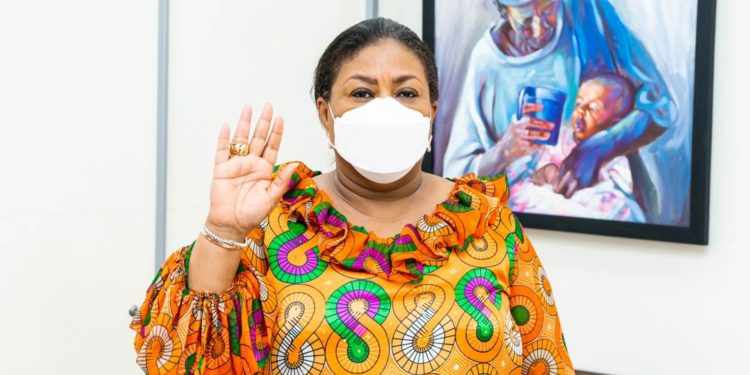The First Lady, Rebecca Akufo-Addo, has said that while the coronavirus pandemic affects everyone everywhere, it affects different groups of people differently, worsening disparities already present.
“We must all join efforts to implement constructive steps to help close these inequalities,” she said.
“Even though earlier evidence suggested that COVID-19 mortality rates were higher for men, other studies claim the pandemic is having catastrophic social and economic effects for more women and girls,” she said.
“This is due to the fact that almost 60% of women work in the informal economy, where they earn less, save less, and are more likely to fall into poverty.”
She continued, “Again, as prices plunge and businesses close, proof abounds that millions of women’s jobs are vanishing, as the majority of them continue to lose paying employment, causing them to participate in unpaid care work as a result of the exigencies of the times, such as school closures and increased elderly care.”
The First Lady made the remarks in a speech on March 8 to commemorate International Women’s Day.
“It’s worth noting that, aside from Ghana and other countries whose male leaders have been lauded for successfully containing and handling the pandemic through strategic initiatives and policies, the majority of countries that have succeeded in stemming the tide are said to be led by women. As a result, we salute Ethiopia’s, New Zealand’s, Germany’s, Finland’s, Denmark’s, Slovakia’s, and other leaders for making us proud. They’ve shown that, amid the pandemic’s new obstacles compounding pre-existing social and systemic barriers that women face in their quest for leadership positions, working together around the campaign theme “#ChooseToChallenge” will help to change the status quo of biases and stereotyping that obstruct gender equality. The UN warns that multiple barriers that have remained unchanged, such as the devaluation of women and girls in some communities, fewer options, and experiences of all types of abuse, are jeopardizing hard-won gains, especially around the COVID-19 era. For example, according to global statistics from 2019, 2.7 billion women were unable to access the same job opportunities as men due to legal constraints, although fewer than 25% of parliamentarians were female.
Women from all walks of life must heed the clarion call to continue to support women’s tireless efforts to bring diverse talents, experiences, insights, and skills to the table, and to make tangible contributions to decisions, policies, and laws that benefit everyone.”
Read Also: Akufo-Addo to deliver State of the Nation Address today
SOURCE: ATLFMNEWSONLINE



























